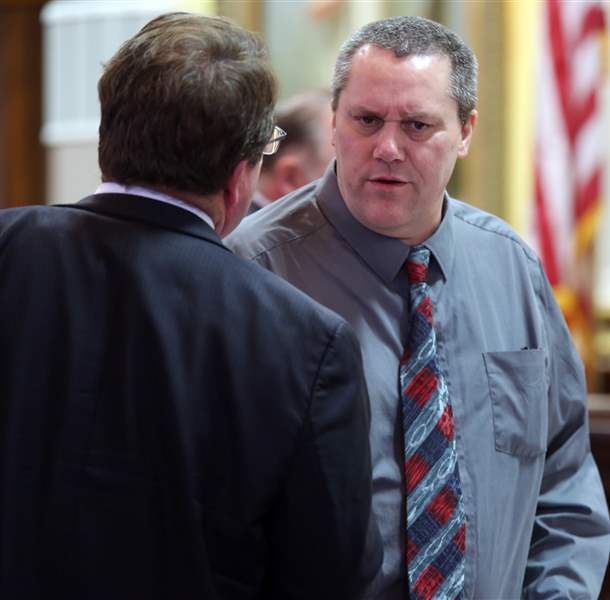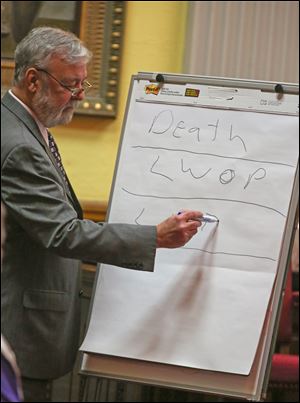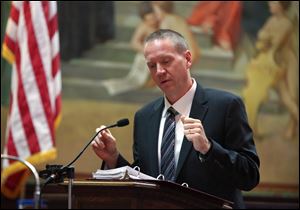
Defense makes case for life in prison for convicted killer Worley
4/3/2018
Defense attorney Merle Dech speaks with his client James Worley, right, during the sentencing phase of Worley's trial in Fulton County Common Pleas Court on April 2, 2018.
The Blade/Jetta Fraser
Buy This Image
WAUSEON — The man convicted of killing Sierah Joughin is a narcissist who exaggerates his abilities and is detached from other people, a psychologist told jurors Tuesday.
John Fabian, a forensic and neuropsychologist hired by the defense, said his examination of James D. Worley, coupled with available medical and court records, and family history, formed a diagnostic picture that includes several personality disorders and a dependency on marijuana.
Mr. Fabian testified Tuesday during the penalty phase following Worley's conviction for the aggravated murder of Ms. Joughin, 20. Because Worley was convicted with death penalty specifications, jurors now must decide if the aggravating circumstances — that he killed her to avoid detection or punishment for another crime, her kidnapping — outweigh mitigating factors that might convince them to give Worley life in prison rather than a death sentence.

Defense attorneys Mark Berling lists the punishment options for convicted murderer James Worley during his sentencing phase.
In his opening statement, defense attorney Mark Berling wrote on a large easel four sentencing options: death, life in prison without the possibility of parole, life in prison with the possibility of parole after 25 year, or after 30 years. He then tore off the last two options.
He said he would ask jurors only to consider life in prison without parole rather than "insult anyone" with more lenient sentences.
“He could get life and she doesn’t, it makes you sick, doesn’t it?” he asked jurors.
Ms. Joughin disappeared July 19, 2016, while riding her bike in rural Fulton County. Her body was found bound, gagged, and buried in a cornfield several days later.
Worley was "difficult to open up,” Mr. Fabian said, adding that the defendant displayed symptoms of sexual sadism and fetishism, as well as paranoid, anti-social, narcissistic, and obsessive compulsive personality disorders.
The psychologist said he saw a connection between the fantasy life centered around Worley’s proclivity for violent pornography and the nature of the crime.
Worley’s talkative nature was “a veneer for some low self-esteem,” and he was impulsive, suspicious, and irritable, Mr. Fabian said.
“His emotional development is somewhat regressed,” he said of Worley. “His ability to feel close to others was skewed.”
Immediate family with mental issues — his mother had Alzheimer's disease and brother has schizophrenia — increase the likelihood of some mental or cognitive issue for Worley, though Mr. Fabian said it cannot be used to predict what conditions might present.
The defense also called Gary Ericson, a capital trial mitigation specialist, who was hired by the defense to collect records and interviews related to Worley’s education, work, and family history.
Jurors heard more than an hour of a taped interview Mr. Ericson conducted with Worley’s sister Cynthia Barlow, an officer with the Los Angeles Police Department. She was scheduled to testify but at the last minute decided against it because it could put her career in jeopardy, Mr. Ericson said.
She described a home life with a father who drank and was violent toward her mother, recalling one incident when her father pulled a knife on his wife and chased her around the house. The incident summoned police to the house, but Ms. Barlow didn’t think much came of it, describing attitudes toward domestic violence at the time as “a personal issue.”
Ms. Barlow said her brother had difficulty in school and repeated a grade in elementary school. He had trouble paying attention, she said, and later struggled to find stable work as an adult.

Fulton County prosecutor Scott Haselman speaking to the jury.
She said in the interview she knew her brother had gotten into fist fights with men, but when investigators called her regarding Ms. Joughin’s disappearance, Ms. Barlow recalled her disbelief.
“I’ve never felt shock like that in my life,” she said.
Regarding the 1990 abduction of Robin Gardner, for which Worley served three years in prison, Ms. Barlow recalled the incident in a similar manner to the way Worley explained it to police: that Ms. Gardner, who was riding a bike, had darted out in front of Worley driving his truck and caused a crash.
While Ms. Gardner testified that Worley struck her, handcuffed her, and threatened to kill her, Ms. Barlow recalled her brother telling her that he used the handcuffs to ensure the woman didn't leave the scene of an accident.
While the recording was at times garbled and the interview meandered in subject matter, Ms. Barlow and Mr. Ericson discussed a woman killed in the 1970s whom Worley had described as "the love of his life," as well as a woman described as a prostitute who went missing in 2000.
"The authorities suspected him of killing her?" Mr. Ericson asked the sister about the missing woman. She said yes but added she had heard the woman was alive and working elsewhere. Neither woman was identified in the interview and neither set of attorneys asked additional questions.
Other testimony Tuesday came from local residents who knew Worley and gave statements to the FBI after Ms. Joughin’s disappearance. William Gombash testified that his wife was always uncomfortable around Worley and he had a feeling for years that something was off.
“It was just a matter of time before he snapped,” he said.
The prosecution called no witnesses and produced no new evidence in the penalty phase. On Wednesday jurors will hear closing arguments from both sides and then begin deliberations.
Contact Lauren Lindstrom at llindstrom@theblade.com, 419-724-6154, or on Twitter @lelindstrom.